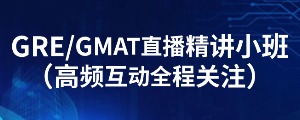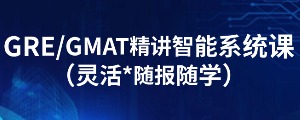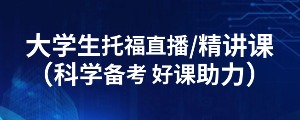选课中心
7099人选课
GMAT公开讲座
0元
GRE公开讲座
0元
一对一体验课
99元
GMAT模考网站
10000人
GRE模考网站
GMAT课程
GRE课程
托福辅导课程
【定制】1v1
私人订制
资料下载
考前冲刺

扫码添加助教
免费领取
备考资料大礼包

扫码关注公众号
新东方在线GMAT频道为大家带来GMAT阅读新题:Passage 16练习题一文,希望对大家GMAT备考有所帮助。更多精彩尽请关注新东方在线GMAT频道!>>点击查看更多GMAT阅读
Passage 16 (16/63)
In 1896 a Georgia couple suing for (sue for: v.控告) damages in the accidental death of their two year old was told that since the child had made no real economic contribution to the family, there was no liability for damages. In contrast, less than a century later, in 1979, the parents of a three-year-old sued in New York for accidental-death damages and won an award of $750,000.
The transformation in social values implicit in juxtaposing these two incidents is the subject of Viviana Zelizer’s excellent book, Pricing the Priceless Child. During the nineteenth century, she argues, the concept of the “useful” child who contributed to the family economy gave way gradually to the present-day notion of the “useless” child who, though producing no income for, and indeed extremely costly to, its parents, is yet considered emotionally “priceless.” Well established among segments of the middle and upper classes by the mid-1800’s, this new view of childhood spread throughout society in the late-nineteenth and early-twentieth centuries as reformers introduced child-labor regulations and compulsory education (compulsory education: n.义务教育) laws predicated in part on the assumption that a child’s emotional value made child labor taboo.
For Zelizer the origins of this transformation were many and complex. The gradual erosion of children’s productive value in a maturing industrial economy, the decline in birth and death rates, especially in child mortality, and the development of the companionate family (a family in which members were united by explicit bonds of love rather than duty) were all factors critical in changing the assessment of children’s worth. Yet “expulsion of children from the ‘cash nexus (cash nexus: 金钱关系, 现金(交易)关系),’ although clearly shaped by profound changes in the economic, occupational, and family structures,” Zelizer maintains, “was also part of a cultural process ‘of sacrelization’ of children’s lives.” Protecting children from the crass business world became enormously important for late-nineteenth-century middle-class Americans, she suggests; this sacralization was a way of resisting what they perceived as the relentless corruption of human values by the marketplace.
In stressing the cultural determinants of a child’s worth, Zelizer takes issue with practitioners of the new “sociological economics,” who have analyzed such traditionally sociological topics as crime, marriage, education, and health solely in terms of their economic determinants. Allowing only a small role for cultural forces in the form of individual “preferences,” these sociologists tend to view all human behaviors as directed primarily by the principle of maximizing economic gain. Zelizer is highly critical of this approach, and emphasizes instead the opposite phenomenon: the power of social values to transform price. As children became more valuable in emotional terms, she argues, their “exchange” or “surrender” value on the market, that is, the conversion of their intangible worth into cash terms, became much greater.
1. It can be inferred from the passage that accidental-death damage awards in America during the nineteenth century tended to be based principally on the
(A) earnings of the person at time of death
(B) wealth of the party causing the death
(C) degree of culpability of the party causing the death
(D) amount of money that had been spent on the person killed(A)
(E) amount of suffering endured by the family of the person killed
2. It can be inferred from the passage that in the early 1800’s children were generally regarded by their families as individuals who
(A) needed enormous amounts of security and affection
(B) required constant supervision while working
(C) were important to the economic well-being of a family
(D) were unsuited to spending long hours in school(C)
(E) were financial burdens assumed for the good of society
3. Which of the following alternative explanations of the change in the cash value of children would be most likely to be put forward by sociological economists as they are described in the passage?
(A) The cash value of children rose during the nineteenth century because parents began to increase their emotional investment in the upbringing of their children.
(B) The cash value of children rose during the nineteenth century because their expected earnings over the course of a lifetime increased greatly.
(C) The cash value of children rose during the nineteenth century because the spread of humanitarian ideals resulted in a wholesale reappraisal of the worth of an individual.
(D) The cash value of children rose during the nineteenth century because compulsory education laws reduced the supply, and thus raised the costs, of available child labor.(B)
(E) The cash value of children rose during the nineteenth century because of changes in the way negligence law assessed damages in accidental death cases.
4. The primary purpose of the passage is to
(A) review the literature in a new academic sub-field
(B) present the central thesis of a recent book
(C) contrast two approaches to analyzing historical change
(D) refute a traditional explanation of a social phenomenon(B)
(E) encourage further work on a neglected historical topic
5. It can be inferred from the passage that which of the following statements was true of American families over the course of the nineteenth century?
(A) The average size of families grew considerably.
(B) The percentage of families involved in industrial work declined dramatically.
(C) Family members became more emotionally bonded to one another.
(D) Family members spent an increasing amount of time working with each other.(C)
(E) Family members became more economically dependent on each other.
6. Zelizer refers to all of the following as important influences in changing the assessment of children’s worth EXCEPT changes in
(A) the mortality rate
(B) the nature of industry
(C) the nature of the family
(D) attitudes toward reform movements(D)
(E) attitudes toward the marketplace
7. Which of the following would be most consistent with the practices of sociological economics as these practices are described in the passage?
(A) Arguing that most health-care professionals enter the field because they believe it to be the most socially useful of any occupation
(B) Arguing that most college students choose majors that they believe will lead to the most highly paid jobs available to them
(C) Arguing that most decisions about marriage and divorce are based on rational assessments of the likelihood that each partner will remain committed to the relationship
(D) Analyzing changes in the number of people enrolled in colleges and universities as a function of changes in the economic health of these institutions(B)
(E) Analyzing changes in the ages at which people get married as a function of a change in the average number of years that young people have lived away from their parents
以上就是新东方在线GMAT频道为你带来的GMAT阅读新题练习题,更多精彩敬请关注新东方在线GMAT频道。
| GMAT直播VIP小班 | GMAT直播精讲班 | GMAT录播课 |
| (VIP小班/全科班+1对1) | (全科精讲/单项备考) | (全科班/单项班) |
| 72.5课时 ¥18800 | 61课时 ¥7796 | 134课时 ¥14680 |

 资料下载
资料下载
新东方GMAT佛脚词汇1.0版本
发布时间:2023-06-30添加新东方美研助教号
回复【资料】获取
新东方GMAT数学500题资料下载
发布时间:2023-05-26添加新东方美研助教号
回复【资料】获取
新东方GMAT800题资料下载
发布时间:2022-05-21添加新东方美研助教号
回复【资料】获取
1000句GMAT真实句子改错问题
发布时间:2022-04-17添加新东方美研助教号
回复【资料】获取
2024杨鹏阅读难句(GMAT+GRE)教程
发布时间:2022-04-17添加新东方美研助教号
回复【资料】获取
新东方GMAT数学500题(解析及答案)
发布时间:2019-11-27添加新东方美研助教号
回复【资料】获取
新东方GMAT800题(逻辑+语法+阅读)
发布时间:2019-11-27添加新东方美研助教号
回复【资料】获取
新东方GMAT佛脚词汇1.0版本
发布时间:2019-11-27添加新东方美研助教号
回复【资料】获取
GMAT词汇/长难句/语法资料大全
发布时间:2019-11-27添加新东方美研助教号
回复【资料】获取
GMAT语文考试圣经(Bible)电子版
发布时间:2019-11-27关注新东方在线美研订阅号
回复【GMAT】获取
GMAT推理圣经PDF电子版
发布时间:2019-11-27添加新东方美研助教号
回复【资料】获取
GMAT考试OG五个版本题号对照表
发布时间:2019-11-27添加新东方美研助教号
回复【资料】获取
GMAT Ultimate Grammar电子书籍PDF
发布时间:2019-11-27添加新东方美研助教号
回复【资料】获取

添加美研助教号,
回复【GMAT】获取备考必看资料包

 推荐阅读
推荐阅读
新东方在线GMAT频道为大家带来GMAT阅读复习的五大步骤,希望对大家GMAT备考有所帮助。更多精彩尽请关注新东方在线GMAT频道! 1:原来
新东方在线GMAT频道为大家带来GMAT阅读背景的培养,希望对大家GMAT备考有所帮助。更多精彩尽请关注新东方在线GMAT频道! 一、经济学
新东方在线GMAT频道为大家带来GMAT阅读复习效率不高怎么办,希望对大家GMAT备考有所帮助。更多精彩尽请关注新东方在线GMAT频道! 建
新东方在线GMAT频道为大家带来GMAT阅读提高速度的根本方法,希望对大家GMAT备考有所帮助。更多精彩尽请关注新东方在线GMAT频道! 1
新东方在线GMAT频道为大家带来GMAT阅读如何避免错误,希望对大家GMAT备考有所帮助。更多精彩尽请关注新东方在线GMAT频道! 要避免GMA
新东方在线GMAT频道为大家带来GMAT阅读技巧的提升,希望对大家GMAT备考有所帮助。更多精彩尽请关注新东方在线GMAT频道! GMAT阅读推
新东方在线GMAT频道为大家带来GMAT阅读备考的注意事项,希望对大家GMAT备考有所帮助。更多精彩尽请关注新东方在线GMAT频道! GMAT阅
新东方在线GMAT频道为大家带来GMAT阅读怎么提高自己的能力,希望对大家GMAT备考有所帮助。更多精彩尽请关注新东方在线GMAT频道! 建
新东方在线GMAT频道为大家带来GMAT阅读长句子的备考,希望对大家GMAT备考有所帮助。更多精彩尽请关注新东方在线GMAT频道! 1 首先
新东方在线GMAT频道为大家带来GMAT阅读水平怎么提高,希望对大家GMAT备考有所帮助。更多精彩尽请关注新东方在线GMAT频道! 下面就来


 GRE/GMAT直播精讲小班
GRE/GMAT直播精讲小班
 GRE/GMAT精讲智能系统课
GRE/GMAT精讲智能系统课
 托福直播/精讲课(30天/60天)
托福直播/精讲课(30天/60天)
 资料下载
资料下载
添加新东方美研助教号
回复【资料】获取
添加新东方美研助教号
回复【资料】获取
添加新东方美研助教号
回复【资料】获取
添加新东方美研助教号
回复【资料】获取
添加新东方美研助教号
回复【资料】获取
添加新东方美研助教号
回复【资料】获取
添加新东方美研助教号
回复【资料】获取
添加新东方美研助教号
回复【资料】获取
添加新东方美研助教号
回复【资料】获取
关注新东方在线美研订阅号
回复【GMAT】获取
添加新东方美研助教号
回复【资料】获取
添加新东方美研助教号
回复【资料】获取
添加新东方美研助教号
回复【资料】获取

 阅读排行榜
阅读排行榜
 相关内容
相关内容